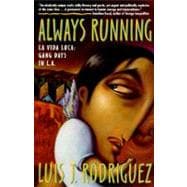By age twelve, Luis Rodriguez was a veteran of East L.A. gang warfare. Lured by a seemingly invincible gang culture, he witnessed countless shootings, beatings, and arrests, then watched with increasing fear as drugs, murder, suicide, and senseless acts of street crime claimed friends and family members. Before long Rodriguez saw a way out of the barrio through education and the power of words, and successfully broke free from years of violence and desperation. Achieving success as an award-winning Chicano poet, he was sure the streets would haunt him no more -- until his young son joined a gang. Rodriguez fought for his child by telling his own story in Always Running, a vivid memoir that explores the motivations of gang life and cautions against the death and destruction that inevitably claim its participants. At times heartbreakingly sad and brutal, Always Running is ultimately an uplifting true story, filled with hope, insight, and a hard-earned lesson for the next generation.








